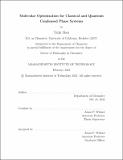Molecular Optimization for Classical and Quantum Condensed Phase Systems
Author(s)
Shen, Yizhi
DownloadThesis PDF (9.610Mb)
Advisor
Willard, Adam P.
Terms of use
Metadata
Show full item recordAbstract
Condensed phase phenomena remain a theoretical challenge to thoroughly understand and elucidate due to the close interactions among large number of microscopic degrees of freedom.
Such deviation from the non-interacting ideality necessitates an effective resolution of the constrained fluctuations and strong correlations in condensed phase systems, which can be methodically achieved using non-Euclidean optimization tools. This thesis is devoted to the optimization-based development of molecular simulations that facilitate our understanding of the static and dynamical properties of many-body systems.
Chapter 1 introduces the background on simulating condensed phase systems and sets up the overall scope of the thesis. Chapter 2 provides a primary exposure to a few fundamental connections between functional minimization on manifolds and essential properties, for example statistical and spectral, of many-body systems.
Chapter 3 considers methods adept at treating representative classical condensed-phase systems. We start with phenomenological spin models on a lattice and turn our attention to atomistic interfaces including aqueous electrolyte-electrode and polymer-protein composite. We discuss proficient schemes to implement and process our molecular simulations, allowing us to elucidate (a)typical structural-dynamical fluctuations to heterogeneities native to these classical systems.
Chapter 4 considers methods capable of studying correlated quantum condensed-phase systems. In particular, we explore the theoretical and numerical underpinnings behind non-parametric simulation schemes that utilize the error-mitigating technique of quantum subspace expansion. We focus on the emergent scenario in which the sub- space is generated by a real-time evolution implemented efficiently on quantum hardware. The practical advantages of the schemes are highlighted through demonstration of their fast and accurate extraction of spectral information.
Date issued
2023-02Department
Massachusetts Institute of Technology. Department of ChemistryPublisher
Massachusetts Institute of Technology